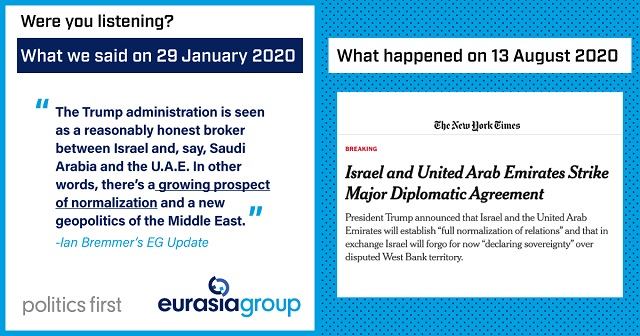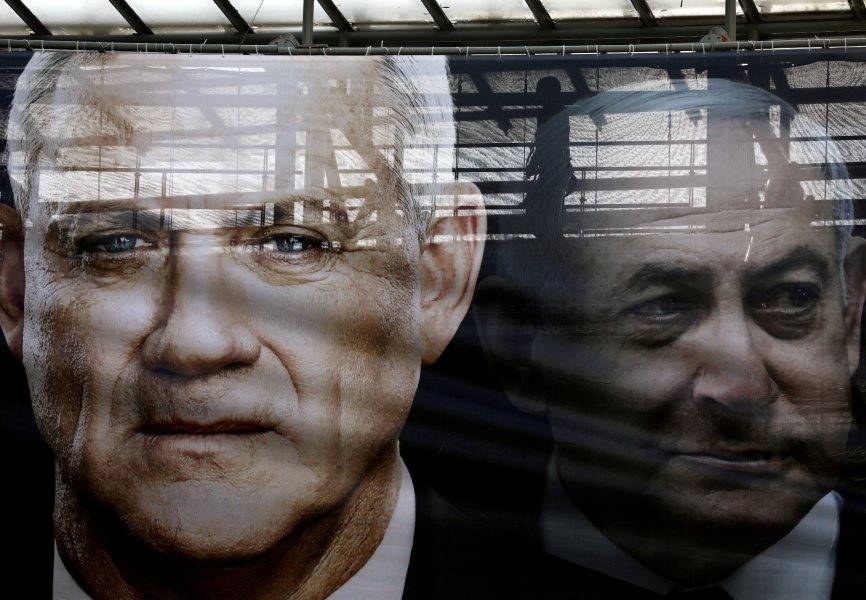Israel is once again on the verge of new elections. If the government fails to pass a budget by 23 December, the country will head to the polls for the fourth time in two years. With the coalition in gridlock, the chances of a last-minute compromise appear slim. Eurasia Group expert
Henry Rome explains the evolving political dynamics.
How did we get here?
Israelis held three elections between April 2019 and March 2020. Lawmakers failed to form governing coalitions after the first two but reached a compromise after the third, under the pressure of a worsening
coronavirus pandemic. Incumbent Prime Minister Binyamin Netanyahu and retired army chief Benny Gantz agreed to form a “national emergency government,” even though Gantz had spent the campaign assailing Netanyahu's leadership and pledging not to work with him. Under the agreement, Netanyahu would continue to serve as premier for the first 18 months and then rotate with Gantz. Reflecting the deep distrust between the two political rivals, the coalition agreement was carefully designed to ensure Gantz got his turn as premier and to preserve the balance of power within the coalition. But the alliance frayed almost immediately as the government struggled to combat the pandemic and Netanyahu cut Gantz out of the loop on key issues. Within months, the Netanyahu-Gantz relationship had become essentially unworkable. Over the summer,
Gantz summed up the dynamics clearly: “I wake up every morning, and for a moment tell myself, 'What've you done?'”
What happens next?
A fundamental task of any government is to pass a budget, but the new coalition has failed to do so. Netanyahu and Gantz could not agree on a spending plan over the summer and decided to punt a decision until 23 December. If no budget is passed, and no other extension is reached, the government will fall, triggering new elections in March. While the budget is at the center of the political fight, the Netanyahu-Gantz dispute has nothing to do with fiscal policy. Owing to a quirk in the coalition agreement, the budget offers an off-ramp to the provision calling for a rotation in the top job: If the government falls because of a failure to pass the budget for 2020 or 2021, new elections are triggered and Netanyahu remains premier in the interim. Gantz has called on Netanyahu to fulfill the coalition agreement's requirement of passing a two-year budget, but Netanyahu has been reluctant to give away his escape hatch. Facing multiple corruption cases in court, Netanyahu wants to remain prime minister at all costs because the office affords him the best position to fight these charges. Gantz upped the ante earlier this month by voting with the opposition on a preliminary measure to dissolve the government, but this has not yet led to a compromise.
Can elections be avoided?
It's possible, but the odds are falling. Netanyahu would need to convince Gantz that he is serious about passing a 2021 budget on time—and that he's not preserving an option simply to wait longer to collapse the coalition. That would require a leap of faith for Gantz, and it is not clear that other members of his party would go along with another compromise with Netanyahu. Recent polling suggests that Gantz's Blue & White party would be crushed in new elections, but continuing to stay in the coalition in the hopes that Netanyahu will fulfill the rotation agreement may no longer be possible. On the other hand, Netanyahu's political incentives have changed significantly in recent days, which could encourage him to back away from new elections. A former member of his Likud party, Gideon Sa'ar, announced he would run on his own party list with the goal of unseating Netanyahu. Early polls show Sa'ar stealing many Likud seats, which could be an existential threat to Netanyahu. But it may be too late to reverse course.
If elections are called, what issues are likely to dominate?
The top three issues in the election will be Netanyahu, Netanyahu, and Netanyahu. As in the previous three votes, a fourth contest would be a referendum on the prime minister, Israel's longest-serving leader. The coronavirus pandemic and ensuing economic crisis will certainly be front-and-center, but largely in the context of Netanyahu's track record during the crisis.
Israel's normalization agreements with the UAE, Bahrain, Sudan, and Morocco are
historic breakthroughs but will probably do little to boost Netanyahu's near-term political standing given the domestic turmoil.
 Learn more:
Learn more:

 A banner depicting Israel's Alternate Prime Minister Benny Gantz and Prime Minister Benjamin Netanyahu.
A banner depicting Israel's Alternate Prime Minister Benny Gantz and Prime Minister Benjamin Netanyahu.

